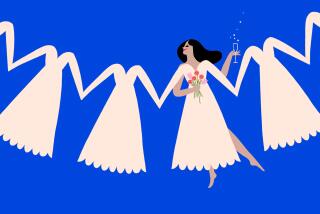Bearded-Lady Saint Offers Comfort to a Generation in Waiting
In a dark corner of the Loreta Chapel near Prague Castle in the Czech Republic, there hangs a bearded lady on a cross above an early rococo altar.
She is known by various names--St. Starosta or St. Wilgefortis among them--and legend has it that her father tried to force her to marry the king of Sicily, despite her vow of virginity.
She prayed to God for help, and God, taking pity on the woman, gave her a beard to repel her future husband.
Her father, furious when he found out, had her crucified. Thus Starosta went into history as the saint of unhappily married women.
I looked up at the figure of the bearded lady while visiting the chapel and thought about the role of marriage in my life.
Like many of my friends, I am in my late 20s and have never married. According to the U.S. Census Bureau, that puts me in one of the fastest-growing categories in the United States.
Nationally, in less than 30 years, the “never married” number has doubled, and the average age of those entering a first marriage is at a record high: 25 for women, 27 for men.
Some consider these trends catastrophic.
“A titanic loss of family values,” according to a recent article in the Washington Times. “Today’s young Americans seem especially indifferent to traditional notions of marriage and morality.”
On the contrary, these trends within my generation indicate a rise of consciousness and commitment that will resurrect the institution of marriage, not destroy it.
My generation grew up in the 1980s, in the midst of the divorce revolution. And if our parents weren’t divorced, a lot of them should have been.
Among the quiet corners of our homes, away from the yelling and the name-calling, we huddled with our brothers, sisters and friends, vowing we would never have a marriage like this one.
When my generation went to college, we soon learned about the research on marriage: Marriage has a much better chance of success if it is postponed.
Your 20s should be a time to forge your identity--a time to travel, meet new people, develop a life philosophy, move to your dream city.
The research was further enforced by the culture of our times. Author Beverly Engel told us about “Loving Him Without Losing You”; Madonna taught us how to “Express Yourself,” and Oprah Winfrey showed us the importance of financial independence.
So my best friend went to medical school, my other best friend joined the Peace Corps and I went to Prague to write a short-story collection.
We wanted to get married, but we wanted to do other things as well. The men we were dating found that attractive and, in fact, seemed to prefer it.
Therefore, it is not surprising that more than 80% of young women surveyed in the 2001 National Marriage Project, conducted by Rutgers University, agreed that “it is more important for them to have a husband who can communicate about his deepest feelings than to have a husband who makes a good living.” (In a 1965 survey, three out of four college women said they would marry a man they didn’t love if he fit their criteria in every other way.) And 94% of the never-married women in their 20s surveyed in the 2001 report agreed that “when you marry, you want your spouse to be your soul mate, first and foremost.”
As the wage gap between men and women closes, as men take on more responsibility at home and in relationships and as women gain ground in higher education and in the work force, the institution of marriage itself is changing.
It is becoming less about security, financial gain and social status. It is becoming about love. Although we are not the first generation to marry for love, we are the first to wait to do so in such great numbers.
It is this awareness of ourselves, of our partners, of our vision of a marriage of soul mates that will resurrect the institution and make it last. Traditional notions of marriage and morality haven’t been working.
It’s time to bring down the bearded lady and give her a chance.
*
Dina Rabadi is a project assistant at the Center for Middle Eastern Studies at the University of Chicago.
More to Read
Sign up for Essential California
The most important California stories and recommendations in your inbox every morning.
You may occasionally receive promotional content from the Los Angeles Times.










